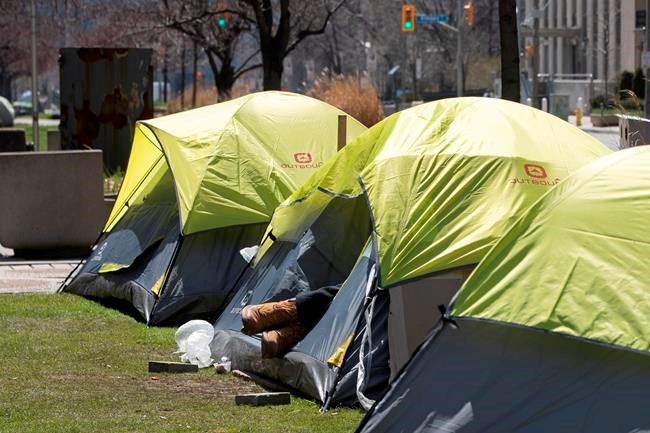VANCOUER, B.C. — Public health officials need to do more to help Canada's homeless population as encampments and tent cities grow across the country during the COVID-19 pandemic, an advocate says.
The comments come as B.C. cities struggle to find adequate solutions to look after their homeless populations.
Fourteen people were arrested Sunday over allegations they broke in to Lord Strathcona Elementary, a school on Vancouver's Downtown Eastside.
A group calling itself the Red Braid Alliance was part of the protest over what its members said was a plan to highlight a demand for housing.
Alliance member Listen Chen said she wasn't hopeful that the city would address the homeless problem.
"The city and the province both have the emergency powers to requisition every single empty hotel room in the city and to shelter people," she said.
"The city of Vancouver is negotiating with individual landlords to open up units, but I don't expect hotel landlords are lining up to open their rooms to a stigmatized population."
Those arrested, ranging from young adults to seniors, face charges of break and enter, Sgt. Aaron Roed with the Vancouver Police Department said.
The growth of such tent cities are a natural occurrence when homeless residents feel unsafe about their living conditions, and the COVID-19 pandemic has heightened those feelings, said Tim Richter, the president of the Canadian Alliance to End Homelessness.
"If they don't want squats, if they don't want expanded rise in encampments then there needs to be a much better and safer response to homelessness today," Richter said in an interview. "The necessary protections that public health is recommending for every other Canadian need to be in place for people experiencing homelessness."
Victoria has requested the provincial government requisition its empty hotels to house its homeless population while in Vancouver, a camp at Oppenheimer Park has swelled to nearly 100 people with nearby residents concerned about violence they say is occurring in the park.
Homeless populations have different health risk factors than other citizens, such as underlying respiratory concerns and poor health, Richter said, adding that increases the possibility of an outbreak sweeping through the sites.
"The fact we have so many people at great risk of this disease for no other reason than lack of a home and access to adequate health care tells you we've got a pressing housing emergency in our country," said Richter.
B.C.'s provincial health officer said she is aware of those concerns.
"We have two emergencies that we're dealing with," said Dr. Bonnie Henry, during a media briefing Monday. "The one, our overdose crises, has been compounded in many ways particularly for those who are homeless and under-housed, people who have substance use disorders, it has been compounded by the restrictions we've put in place to deal with the pandemic.”
The province announced a cross-ministerial team last week, headed up by Minister of Social Development and Poverty Reduction Shane Simpson, aimed at finding housing solutions.
Simpson called for patience when asked about the group's concerns.
"I understand the urgency, frustration and barriers that people experiencing homelessness are facing right now. We are working to increase supports and will have more to say in the coming days. That being said, I cannot condone breaking the law and occupying a school at any time," he said in a statement.
Both Henry and Simpson said they expect an announcement on housing to be made within the next few days.
This report by The Canadian Press was first published April 21, 2020.
The Canadian Press




